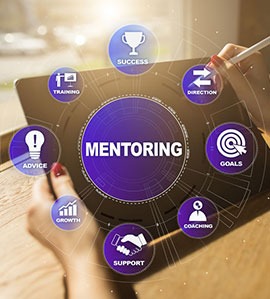Remembering the Basics and Benefits of Mentoring
For most of us, this summer is unlike any other we have ever experienced. COVID-19 still has its grip on us, we’re still being asked to socially distance ourselves, and we’re still finding ourselves stuck at home when all we really want to do is go to the pool, the beach, or a restaurant.
My family has been self-isolating since March given my son’s special needs issues and major health risks. My husband and I don’t go into stores unless we absolutely have to, preferring to use a drive-though option or curbside pick-up. Thankfully, we’ve stayed healthy so far and my son has been in good spirits for the most part—even though he’s been stuck at home for months with just us as his entertainment. But I’ve also noticed that he has been sleeping more and not necessarily doing much to engage his mind or his muscles. This concerns me because his muscles could atrophy and cause contractures if we don’t help him stretch and change positions from time to time.
 This idea of simple stretches and getting back to basics makes me also think about how we treat our mentoring relationships. It can be quite easy (and understandable given today’s circumstances) to let your relationship slide a little. Maybe you haven’t been giving it all the attention and care it needs. But ignoring the core basics that you need for mentoring right now can make the relationship deteriorate.
This idea of simple stretches and getting back to basics makes me also think about how we treat our mentoring relationships. It can be quite easy (and understandable given today’s circumstances) to let your relationship slide a little. Maybe you haven’t been giving it all the attention and care it needs. But ignoring the core basics that you need for mentoring right now can make the relationship deteriorate.
Here are three fundamentals you need to keep in mind for your mentoring relationship as you work to keep it healthy.
1. Mentoring Agreements
Mentoring agreements create the foundation for your mentoring relationship. These provide you with the opportunity to clearly articulate what you want to learn during your relationships, the goals you want to set, the areas you can help someone develop, how long you want the relationship to last, etc. Agreements can also help you spell out what mentoring is for you and your mentoring partner—as well as what it is not.
Having a mentoring agreement in place is a critical first step for every relationship. When you have an agreement in place, you have a core document you can return to when you lose your way during the relationship. You can reassess the agreement to make sure it still fits your needs—especially given all of the upheaval going on in our lives these days. It can help you get back on track regarding your goals and the purpose for coming together in a mentoring relationship in the first place.
2. Communication Considerations
 Understanding how and when your mentoring partner prefers to communicate is a basic consideration every mentoring relationship should address. Working from home due to COVID-19 threw many people for a loop. Perhaps your face-to-face mentoring meetings could no longer happen and you needed to transition to a virtual mentoring relationship. Discussing these issues can help you stay connected and provide you with a chance to begin a conversation.
Understanding how and when your mentoring partner prefers to communicate is a basic consideration every mentoring relationship should address. Working from home due to COVID-19 threw many people for a loop. Perhaps your face-to-face mentoring meetings could no longer happen and you needed to transition to a virtual mentoring relationship. Discussing these issues can help you stay connected and provide you with a chance to begin a conversation.
Stretching your communication muscles may require you to reach out to your mentoring partner in news ways, such as video calls or text. However, gaining the flexibility that comes with trying new communication options can help you not only stay connected, but also give you new tools and skills that you can apply in other areas of your life.
3. Trust-building Tactics
Another fundamental piece of a mentoring relationship is building trust with one another. If we ignore this factor or stop actively working on it, those actions can negatively affect how we relate to one another and how our relationship progresses.
Trust forms when we speak honestly with one another and follow through on our commitments to one another. Honest mentoring conversations are purposeful, candid, and genuine. It is critical that these qualities remain present in order for you to have a healthy relationship. Don’t let these get overlooked because you get too busy or distracted. Be sure to keep this fundamental aspect of your mentoring relationship front and center.
My husband and I have been working to keep our son’s muscles stretched and flexible. We are also spending more time on activities that can help stimulate his mind and creativity, like art projects, board games, quizzes, and game shows that help him learn. Reminding ourselves of the critical nature of these basic needs has helped us recommit ourselves to doing our best with our son’s development. I have every belief that you can do the same in your mentoring relationship by remembering the fundamentals.








